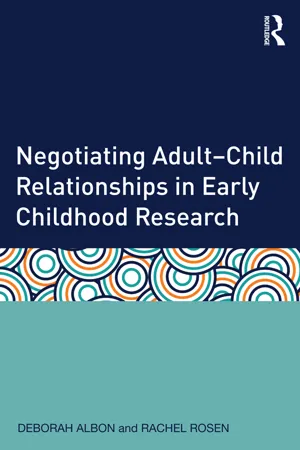
Negotiating Adult-Child Relationships in Early Childhood Research
- 152 pages
- English
- ePUB (mobile friendly)
- Available on iOS & Android
Negotiating Adult-Child Relationships in Early Childhood Research
About This Book
Negotiating Adult–Child Relationships in Early Childhood Research presents a substantive critique of technicist and neoliberal approaches to ethics through an exploration of the complicated and often 'messy' situations faced in negotiating relationships in research with children. Despite growing acknowledgement of their centrality, relationships between adult researchers and very young participants have been neglected and under-theorised, and in response, this book offers a comprehensive conceptualisation of adult–child research relationships through examination of questions, including:
-
- How do power and inequity impact on adult–child research relationships?
-
- What does it mean for relationships when researchers 'intervene' in the field?
-
- How do bodies matter in research relationships?
-
- What does an emphasis on relationships with young children mean for the research process?
Drawing on data from their own research, the authors contend that relationships are part of a wider web of social relations and space–time configurations. They propose and develop a relational ethics of answerability and social justice, inspired by the work of Bakhtin and, in addition, explore the way material bodies come to matter, the ambiguity of consent in educator-research, and the risks and possibilities of research relationships. Chapters include innovative formulations of reciprocity, 'sensing practices', and political-ethical responsibility.
This book contributes to current debates about research with young children, offering an incisive and thorough exploration of the importance of relationships to the research process. Relevant for international audiences, this book is essential reading for early childhood students and educators, researchers, and lecturers with an interest in research with children.
Frequently asked questions
Information
Table of contents
- Cover
- Half Title
- Title Page
- Copyright Page
- Table of Contents
- Acknowledgements
- 1. Considering adult–child relationships in research
- 2. The spaces and places of research relationships
- 3. Children and adults, participants and researchers: What do we make of each other?
- 4. A web of relationships: Encounters between researchers, educators, and children
- 5. The educator as researcher: Implications for research relationships
- 6. Generating data, generating relationships: From observation to sensing practices
- 7. ‘Civilising’ children, confronting inequalities: Navigating narratives of the ‘good researcher’
- 8. Building common cause with children: Reciprocity in the research process
- References
- Index